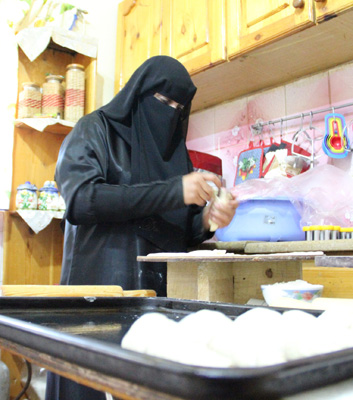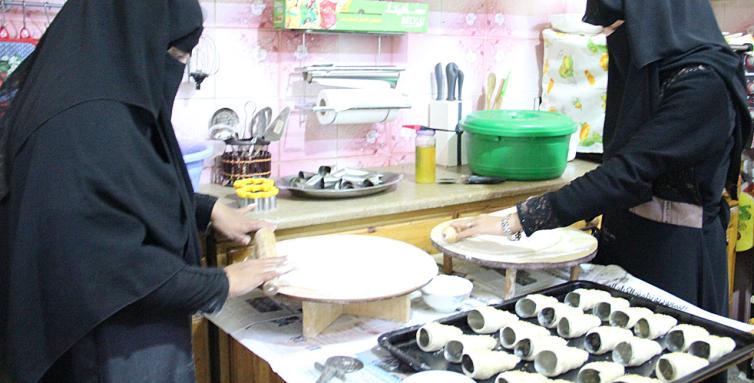Business in difficult times
People move with a sense of purpose through the streets of Hadaa, a district in the Yemeni capital Sanaʼa. They are vigilant, ever alert to the possibility of an air raid or bomb attack. The subliminal feeling of insecurity is ever present – but life goes on, it has to go on. The streets are filled with the aroma of freshly baked bread. Despite the destruction, everyday life runs its course. That’s also how Safa’a Albatool sees it. The door to her small bakery swings open and shut with a steady stream of customers – most of them women buying supplies for their families. In addition to fresh bread, the 38-year-old offers a wide selection of cakes and confectionery. Few of her customers leave without adding a tasty pastry or two to their purchases.

Back in early 2015, things were very different for Albatool. She had successfully taken part in a course for entrepreneurs organised by the International Labour Organization (ILO). Armed with a business plan and lots of good ideas, she opened her bakery. But just a few months later, when war broke out, she was on the brink of giving up. ‘The war and economic crisis left people with very little money. During that period I earned no more than 24,000 rial (around EUR 90) per week. That was nowhere near enough to live off.’ Albatool’s family went through hard times. She had three children to support, and her husband lost his job at the outbreak of war. All hope rested on the new business idea. Albatool recalls: ‘We were in absolute despair, it was our only source of income.’
Inspired by virtual advice
Then came a glimmer of hope: an offer from the organisation Small and Micro-Enterprises Promotion Services to take part in a digital training course. The organisation had collaborated with GIZ to launch a WhatsApp advisory service for women in business. So far it has provided virtual advice to over 300 women. On behalf of the German Federal Ministry for Economic Cooperation and Development, GIZ is using well-established networks with NGOs, associations and government partners to support entrepreneurs in Yemen. If they can keep their small businesses going, they help to create jobs and income in the country in spite of the war and destruction.

![]()
![]()
![]() Picture gallery: In the small bakery
Picture gallery: In the small bakery
‘The WhatsApp advice proved a lifesaver for me. We were a group of 18 women, all from very different sectors, and we had one advisor. My business survived – thanks to the training course and ideas I got from the group as a whole. I now earn three times as much as before,’ says the baker cheerfully. The advisor spent a month texting the women practical examples by smartphone on how to do their accounting. The business models of each individual participant were scrutinised by the group with a view to identifying weaknesses and developing solutions. For a month, Safa’a Albatool was hardly off her smartphone. But her efforts were rewarded: ‘The prices I had calculated for my products were much too low. Several women in the group suggested I should expand my product range. I realised I needed a unique selling point if I was to attract bigger orders and more affluent customers.’
On the road to success
The energetic entrepreneur immediately implemented the innovations. Today, her store window is filled not only with bread, but also with cakes, croissants and sweet and savoury pastries. She has also opened up new sales channels. ‘The advisor told me to start using social media. Now my customers can see my products on Facebook, Instagram and WhatsApp. And I hand out business cards at the bazaar or social gatherings.’ Her success bears out the approach. She already supplies small businesses and schools and her passing trade has grown rapidly. She also employs two members of staff. In addition, her success has transformed her self-confidence. Where once her sole focus was on the survival of her family, today she has much loftier ambitions: ‘I want to be a successful businesswoman. My aim is to keep expanding the business so I can employ more women without jobs.’
Although the WhatsApp advice came to an end over a year ago, the group still exists. The women – shop owners, midwives, dentists, nursery school teachers – come from different parts of the country and have never met in person. Travel is too dangerous and transport costs too high. Nevertheless, Safa’a Albatool regards the members of the group as her friends: ‘We know so much about one another, we know each other’s fears and concerns and we trust one another. That’s why we keep in touch. If one of us has a problem, we offer mutual support – regardless of where we live or to what extended family we belong.’
Contact: GIZ Yemen > giz-jemen@giz.de
March 2017
